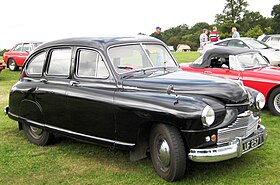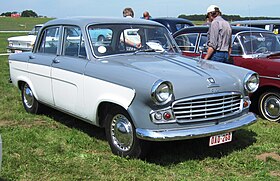Standard Vanguard
| Standard Vanguard | |
|---|---|

1951 Standard Vanguard Phase I Saloon
|
|
| Overview | |
| Manufacturer | Standard Motor Company |
| Production | 1947–1963 |
| Assembly | United Kingdom Australia New Zealand (Motor Assemblies) |
| Chronology | |
| Predecessor | Standard Fourteen |
| Successor | Triumph 2000 |
| Standard Vanguard Phase I | |
|---|---|

Standard Vanguard Phase I Saloon
|
|
| Overview | |
| Production | 1947–1953 174,799 made |
| Designer | Walter Belgrove |
| Body and chassis | |
| Body style | 4-door saloon 4-door estate car 2-door coupe utility (Australia) 2-door van |
| Powertrain | |
| Engine | 2,088 cc (127.4 cu in) Standard "four" I4 |
| Transmission | Three speed manual Overdrive optional from 1950. |
| Dimensions | |
| Wheelbase | 94 in (2,388 mm) |
| Length | 166 in (4,216 mm) |
| Width | 69 in (1,753 mm) |
| Height | 64 in (1,626 mm) |
| Standard Vanguard Phase II | |
|---|---|

Standard Vanguard Phase II Saloon
|
|
| Overview | |
| Production | 1953–1956 81,074 made |
| Body and chassis | |
| Body style | 4 door saloon 2 door estate car 4 door estate car 2 door coupe utility (Australia) 2 door panel van |
| Powertrain | |
| Engine | 2088 cc Straight-4 2092 cc Straight 4 Diesel |
| Transmission | Three speed manual Overdrive optional. |
| Dimensions | |
| Wheelbase | 94 in (2,400 mm) |
| Length | 168 in (4,300 mm) |
| Width | 69 in (1,800 mm) |
| Standard Vanguard Phase III Standard Vanguard Sportsman Standard Ensign |
|
|---|---|

Standard Vanguard Phase III Saloon
|
|
| Overview | |
| Production | 1955–1958 37,194 Phase III, 901 Sportsman, 18,852 Ensign and 2318 Ensign de-luxe made |
| Body and chassis | |
| Body style | 4 door saloon 4 door estate car 2 door coupe utility (Australia) |
| Powertrain | |
| Engine | 2088 cc Straight-4 (Phase III) 1670 and 2138 cc (Ensign) |
| Transmission | Four speed manual Overdrive optional automatic from 1957. |
| Dimensions | |
| Wheelbase | 102.5 in (2,604 mm) |
| Length | 172 in (4,369 mm) |
| Width | 67.5 in (1,714 mm) |
| Height | 61.5 in (1,562 mm) |
| Standard Vanguard Vignale | |
|---|---|
 |
|
| Overview | |
| Production | 1958–1961 26,267 made |
| Designer | Giovanni Michelotti |
| Body and chassis | |
| Body style | 4 door saloon 4 door estate car 2 door coupe utility (Australia) 2 door panel van |
| Powertrain | |
| Engine | 2088 cc Straight-4 |
| Transmission | Four speed manual Overdrive optional automatic |
| Dimensions | |
| Wheelbase | 102 in (2,591 mm) |
| Length | 172 in (4,369 mm) |
| Width | 68.5 in (1,740 mm) |
| Height | 60 in (1,524 mm) |
| Standard Vanguard Six | |
|---|---|
 |
|
| Overview | |
| Production | 1960–1963 9953 made |
| Designer | Giovanni Michelotti |
| Body and chassis | |
| Body style |
|
| Powertrain | |
| Engine | 1998 cc Triumph "Six" I6 |
| Transmission | Three or four-speed manual Overdrive optional automatic |
| Dimensions | |
| Wheelbase | 102 in (2,591 mm) |
| Length |
|
| Width | 67.5 in (1,714 mm) |
| Height | 60 in (1,524 mm) |
The Standard Vanguard is a car which was produced by the Standard Motor Company in Coventry, England from 1947 to 1963.
The car was announced in July 1947, was completely new, with no resemblance to the previous models, and, designed in 1945, it was Standard's first post-Second World War car and intended for export around the world. It was also the first model to carry the new Standard badge, which was a heavily stylised representation of the wings of a griffin.
In the wake of the Second World War many potential customers in the UK and in English-speaking export markets had recently experienced several years of military or naval service, therefore a car name related to the British Navy carried a greater resonance than it would for later generations. The name of the Standard Vanguard recalled HMS Vanguard, the last of the British Navy's battleships, launched in 1944 amid much media attention, permission to use the name involved Standard in extensive negotiations with senior Royal Navy personnel.
The styling of the car was intentionally modelled on the (). although the Russian media claimed that the styling of the Vanguard had been in part influenced by Russian GAZ-M20 Pobeda, which had been in development from 1943 and went into production in 1946. In 1952 The Motor magazine stated that the Soviet Pobeda "shows a certain exterior resemblance to the Standard Vanguard", disregarding the fact that the Pobeda had been launched a year before the Vanguard.
Although it is often said the styling resembled a Plymouth, that car was not slab-sided like the Vanguard, and the style of the Russian car is nearer the mark. Walter Belgrove was responsible. Early cars had deep doors that blended into the bottom of the sills.
The Vanguard was first exhibited to the public at the Brussels Motor Show in February 1948. It began to come off the assembly lines in the middle of 1948 but all production was allotted to the export trade. An estate car and a utility pick up version were announced in September then a 12 cwt delivery van. Aprons were fitted over the Vanguard's rear wheels from September 1949.
...
Wikipedia
